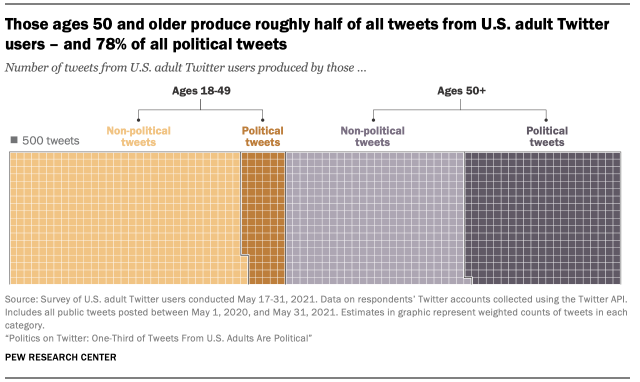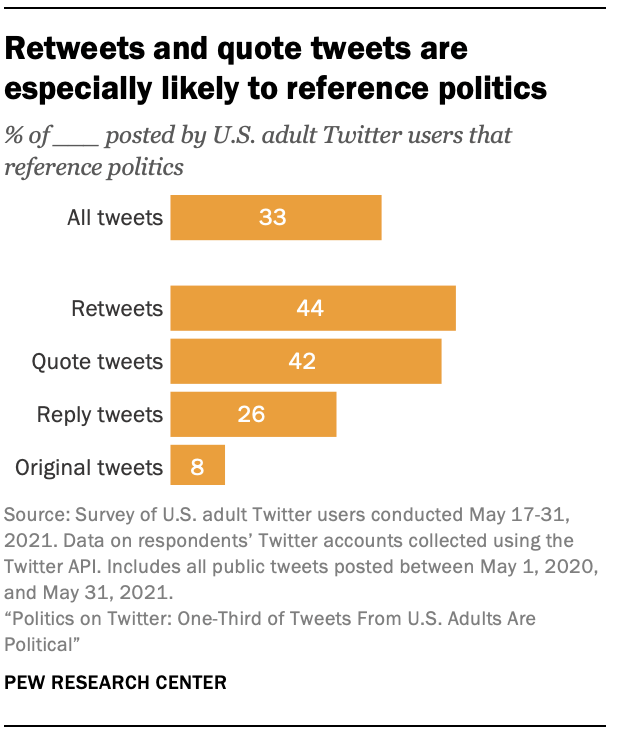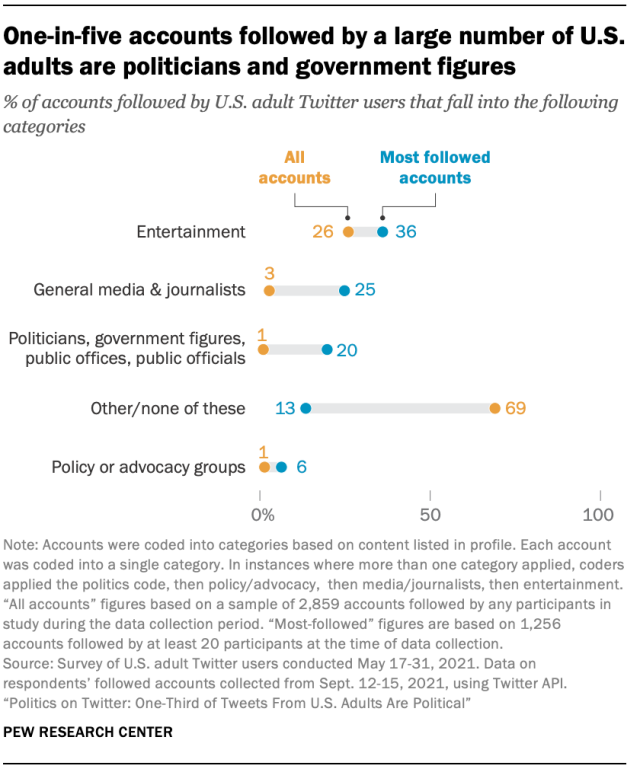All those ages 50 and older produce 78% of all political tweets from U.S. adults
BY SAM BESTVATER, SONO SHAH, GONZALO RIVER0 and AARON SMITH
Pew Investigation Heart done this research to achieve insight into Twitter users’ political engagement, attitudes and behaviors on the system. For this analysis, we surveyed 2,548 U.S. adult Twitter users in Might 2021 about their activities on the website, as effectively as how they engage with politics outside the house of Twitter. Everybody who took part in this study is a member of the Center’s American Trends Panel (ATP) – an on the internet study panel that is recruited by nationwide, random sampling of residential addresses – and indicated that they use Twitter.
In addition to the survey findings, scientists from the Centre also examined the real Twitter profiles of a subset of study participants who agreed to share their handles for investigation applications. To start with, scientists gathered all of the publicly obvious tweets posted involving May possibly 2020 and May possibly 2021 by these buyers. Scientists then applied a device finding out classifier to discover which of those tweets stated politics or political principles. 2nd, they gathered a random sample of 2,859 accounts followed by at the very least 1 of these users – as nicely as all of the accounts adopted by 20 or additional respondents – and manually categorized them into distinctive substantive groups centered on their profile information. For additional data on the distinctive solutions made use of in this evaluation, see the report methodology.
In this article are the thoughts utilized for the report, along with responses, and its methodology.
About 1-quarter of American adults use Twitter. And when they share their views on the website, fairly frequently they are accomplishing so about politics and political challenges. A new Pew Research Center evaluation of English-language tweets posted concerning May 1, 2020, and Might 31, 2021, by a agent sample of U.S. adult Twitter users finds that entirely one-third (33%) of those tweets are political in nature.
Echoing the Center’s conclusions in its prior studies of tweeting behavior, whether political or otherwise, the huge majority of these political tweets are produced by a minority of buyers. And specific demographic groups are especially active contributors to the total volume of political content material on Twitter. Most notably, Individuals ages 50 and more mature make up 24% of the U.S. adult Twitter populace but make nearly 80% of all political tweets. And 36% of the tweets created by the common (median) U.S. grownup Twitter person age 50 or older incorporate political content material, around five instances the share (7%) for the tweets from the regular 18- to 49-calendar year-old.

Additional broadly, People in america who tweet the most about politics differ in several techniques from people for whom politics is a less central topic of dialogue. These “high-volume” political tweeters are considerably more likely than other customers to say that they use Twitter to specific their very own thoughts (67% vs. 34%) that they talk about politics with other individuals at least at the time a 7 days (53% vs. 33%) that they contributed to a political marketing campaign in the final year (46% vs. 21%) or that they participate in politics simply because they enjoy it, as opposed to viewing it as a civic duty (27% vs. 14%).
At the very same time, a larger share of these politically vocal consumers say the men and women they follow on Twitter have similar political sights to their very own (45% vs. 25%). And regardless of – or probably for the reason that of – their common forays into the earth of political tweeting, those who tweet the most about politics are actually much less likely than other end users to say that Twitter is an helpful way to get men and women to alter their minds about political or social problems. Just 34% of the most lively political tweeters feel this way, when compared with 50 % of those who tweet a lot less about politics.
This assessment builds on the Center’s prior research on political content material on Twitter, which discovered suitable content material employing reasonably demanding, keyword-dependent ways. For instance, our 2019 examination of politics on Twitter targeted on discussions of politics at the national degree and classified tweets as political in nature only if they “mention[ed] or convey[ed] support or opposition toward national politicians or elected officers, political get-togethers, ideological teams or political institutions, or particular political behaviors like voting.” This definition excluded mentions of state or regional politics and politicians, as well as discussions of plan difficulties and recent situations that carry a political valence but do not explicitly reference countrywide political figures or teams.
This new assessment identifies political written content with a lot more nuance and subtlety. Scientists at the Center trained a supervised equipment understanding classifier on an pro-validated selection of tweets that human coders had read and classified according to whether or not they referenced political officers and activists, social troubles, or information and latest events. This classifier was then ready to understand the textual styles and conditions that guide human visitors to understand a tweet as “about politics” and discover this sort of designs in tweets that human beings experienced not formerly coded. With a broader definition of political content and a extra flexible classifier, this evaluation a lot more comprehensively reflects the vary and variety of political dialogue as it occurs on platforms like Twitter. Not surprisingly offered these definitional differences, the current assessment identifies a larger sized share of tweets as political in mother nature.
Between the other major findings of this examination of the political traits, attitudes and online behaviors of U.S. adults on Twitter:

Retweets and quotation tweets are extra likely to have political information than primary tweets. This assessment of a single 12 months of tweets from a representative sample of U.S. grownup Twitter consumers finds that selected sorts of tweets are far more likely than others to comprise political written content. Around four-in-ten retweets (44%) and estimate tweets (42%) from these end users ended up discovered to pertain to politics. But that share falls to 26% for replies – and to just 8% for unique tweets.
Democrats and Republicans who use Twitter have distinct political ordeals on the web-site. A larger share of Democrats than Republicans (which includes political independents who “lean” towards either social gathering) say they have tweeted about political or social troubles in the 30 times preceding the study (30% vs. 17%). And a larger sized share of Democrats say that Twitter is extremely effective at elevating general public awareness about political or social concerns (28% vs. 17%).
Americans from each individual party also report seeing different varieties of political articles on the web-site. Democrats who use Twitter are twice as possible as Republicans to say they generally abide by accounts with very similar political beliefs to their very own (40% vs. 20%) or that they disagree with couple or none of the tweets they see (33% vs. 16%).
But some Twitter behaviors cross get together traces. Notably, an equivalent share of Democrats and Republicans on Twitter (17%) say they tweeted about sporting activities in the 30 days previous the study.

Political figures make up 20% of the accounts followed by a big variety of U.S. older people. Politicians, government figures, public places of work, and public officials make up just 1% of all the accounts followed by this agent sample of U.S. adult Twitter customers. But these entities are significantly extra commonplace among the most-adopted accounts: Absolutely 20% of the accounts followed by at least 20 specific respondents fall into this class. Media businesses and journalists, as properly as plan or advocacy organizations, are also notably more commonplace in the accounts that are widely followed by U.S. grown ups on Twitter.
“Twitter-only” political engagement is reasonably rare. The Center’s survey asked about a selection of political behaviors that buyers may well just take, the two on Twitter (these types of as tweeting about a political or social situation) and off (these types of as voting or contributing cash to a marketing campaign). The broad majority of Twitter end users engaged in at least 1 of these pursuits in the preceding 12 months. By much the largest share – 58% – engaged both on Twitter and elsewhere, and one more 34% took portion only in non-Twitter attempts. Just 3% of U.S. grownup Twitter buyers say they took some kind of political or civic motion on Twitter in the final year but did not do so outside the platform.
End users say political information will make up a bigger share of what they see than of what they post. Some 41% of U.S. grownup Twitter customers say that a whole lot of what they see on Twitter is similar to political or social concerns. But just 12% say a good deal of what they on their own write-up is associated to these topics.




